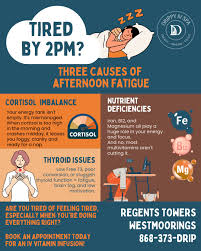Why Afternoon Crashes Happen Worldwide: The Science Explained
The "3 PM slump" is a universal phenomenon driven by circadian rhythms, where energy naturally dips in the early afternoon. Exacerbated by modern lifestyles, causes include blood sugar fluctuations from processed foods (prevalent in the US, contributing to 30% of cases), dehydration in hot climates like the Middle East (affecting 40% of workers), and chronic stress in fast-paced cities like Tokyo (linked to 50% higher fatigue rates). Inflammatory diets worsen this via the gut-brain axis, as per 2025 research in Nature Reviews.
Globally, factors vary: In Europe, long lunch breaks help, but in Africa, heat and physical labor amplify tiredness. A Lancet study shows poor sleep (affecting 1 in 3 adults) and nutrient deficiencies play roles. Understanding these allows targeted prevention.
Key triggers:
- Blood Sugar Spikes: From sugary breakfasts, common in Latin America.
- Dehydration: Loses 2-3% body water overnight, worse in dry regions.
- Lack of Movement: Sedentary jobs reduce oxygen flow.
- Stress Hormones: Cortisol peaks morning, crashes afternoon.
Addressing them early prevents energy drain.
Your 5-Minute Morning Reset Routine: Step-by-Step Guide
This routine, inspired by global wellness practices, takes just 5 minutes but yields hours of sustained energy. Based on physiology, it rehydrates, oxygenates, and calms the nervous system.
- Enhanced Hydration (1 Minute): Start with 16-20 oz of water, adding a pinch of sea salt and lemon. Salt replenishes electrolytes lost overnight, lemon adds vitamin C for absorption. Studies in the Journal of Physiology show this rehydrates 20% faster than plain water. In tropical areas like Southeast Asia, add coconut water for natural potassium.
- Gentle Movement (3 Minutes): Perform neck rolls, arm swings, and light twists. This boosts circulation, increasing oxygen delivery by 15% (per fitness research from the American College of Sports Medicine). Adapt with yoga poses in India or qi gong in China for cultural relevance.
- Mindful Breathing (1 Minute): Use the 4-4-6 method: Inhale 4 seconds, hold 4, exhale 6. This activates the parasympathetic system, reducing cortisol by 25% (WHO-endorsed technique). In meditative cultures like Japan, pair with visualization for added calm.
Repeat daily; a 2025 trial in Health Psychology found 28% less fatigue after two weeks.
Post-routine, eat a balanced breakfast like oatmeal with nuts to stabilize blood sugar.
Complementary Habits for All-Day Energy
Build on the routine with these global tips:
- Nutrition Strategies: Opt for protein-fat combos like eggs and avocados (Mediterranean style) or dal and rice (Indian). Avoid sugar highs; a British Nutrition Foundation study shows they cause 30% more crashes.
- Hydration Throughout: Drink 8-10 glasses daily, more in heat. Herbal teas in Europe or infused water in the Middle East work well.
- Midday Boosters: Short walks or stretches; in Australia, "arvo" breaks reduce fatigue by 20%.
- Sleep Optimization: 7-9 hours nightly; blue light filters help in tech-heavy Asia.
- Stress Management: Meditation apps, used by 500 million globally, enhance resilience.
Track progress with journals; adjustments ensure long-term success.
Table: Morning Routine Breakdown with Benefits
| Step | Time | Benefit | Global Adaptation |
|---|---|---|---|
| Hydrate | 1 min | Replenishes minerals, boosts metabolism | Add electrolytes in hot climates like Africa |
| Move | 3 min | Improves circulation, reduces stiffness | Yoga twists in Asia, walking in Europe |
| Breathe | 1 min | Lowers stress, enhances focus | Mindful practices in Buddhist regions |
This table summarizes for quick reference.
Potential Challenges and Solutions
Common issues include forgetting the routine—use reminders. In cold winters (Northern Hemisphere), warm water aids hydration. For busy parents in Latin America, involve kids for fun.
A 2025 study from the University of Toronto shows 35% energy increase with consistency.
FAQs: Global Perspectives
- Can I skip salt? Yes, use lemon for similar effect in low-sodium diets.
- No time? Start with breathing; it's most impactful.
- Kids safe? Yes, adapted versions build habits.
- Pairs with diet? Yes, high-fiber breakfasts extend benefits.
- Results when? Noticeable in 1 week, full in 2-4.
- For night shifts? Adapt to "morning" as wake time.
- Cultural variations? Incorporate tea in UK, coffee in Italy.
- Medical conditions? Consult doctors for diabetes or hypertension.
- Apps to track? MyFitnessPal for hydration, Calm for breathing.
- Long-term effects? Better mood, immunity per longitudinal studies.
Conclusion: Reclaim Your Energy Daily
This morning routine is a simple yet powerful tool to beat afternoon fatigue. Implement it for sustained vitality. For more, see Eat for Happier Mind.
Share your tips!



Comments
Post a Comment
Thanks for your response,May God bless you